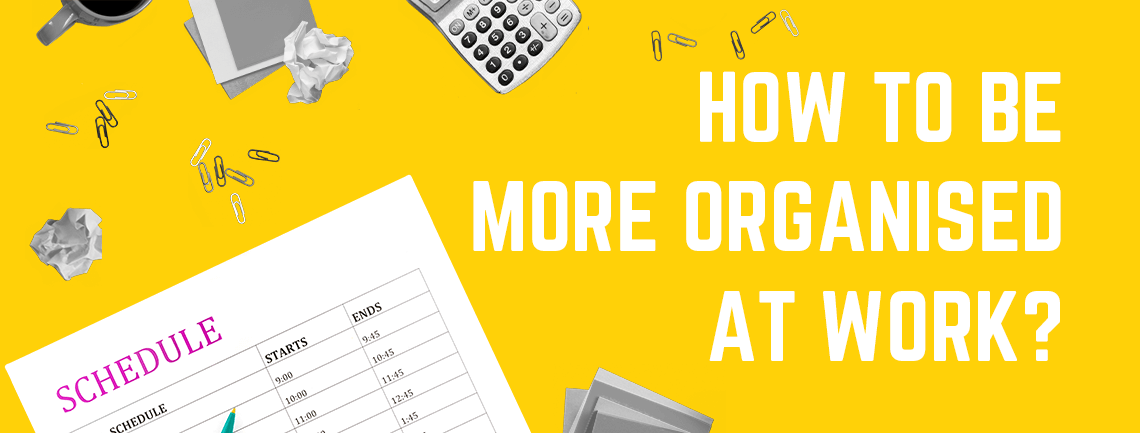How to Be Organised at Work
You can add days to your workweek just by organising your work properly. Here are simple productivity tips which you can apply today. October 8, 2018In 1817 the Welshman Robert Owens advocated for shortened work hours. At that time 16 hour work days were a common thing, but people back then were far from productive the whole time. Robert Owens’ slogan for change was:
“Eight hours labour, eight hours recreation, eight hours rest.”
It’s what eventually became the norm and it’s how we work today. Eight hours at the office, eight hours of recreation (or for some – a side hustle) and that many hours of sleep.
Depending on your work schedule, these time slots vary, but all people have one thing in common – we work at a minimum of eight hours a day if you’re employed full time. But are you organised during your work hours?
It turns out that office workers work around 45% of their time. The rest is taken by side tasks like reading news, responding to emails and time-wasting meetings. But there is a way to become more productive, it just boils down to organising your work and prioritising your tasks in order to make the most out of the eight hours you have in your office.
With a plethora of time organisational, task tackling techniques available online it’s easy to get lost trying out new methods of improving your workflow and just wasting your time. So, let’s see how you can Fantastic-ate your work schedule and optimise your workflow to be as productive as possible, reaching every goal you set for yourself.
How to Be Organised at Work
The world’s most successful people are well known for utilising different time and work organisational techniques to achieve more, learn more and overall advance in all aspects of their lives.
While the abundance of information online gives some amazing tips, they rarely work on their own, and more often than not you use them once and never try them again. That’s why you have to create a workflow, instead of using different to-do’s, Pomodoro techniques, etc. In order for them to work, they have to be in a perfect symbiosis.
The workflow that we’re going to share is often used by Fantastic employees on a daily basis, so if you’re on your journey of starting your business, looking for a way to break through the corporate world or just want to master the nine-to-five you can benefit from this workflow.
1. Plan your day the evening before
Alexander Bell once said that preparation is key to success, and it is. Developing an evening routine is one of the best ways to set yourself for success. Given that not all people have PA’s to take care of their schedules, it’s your (second) job to keep your workday organised.
Organising your workday the night before is a great way to minimise the chance of getting into an unplanned meeting or spend 35 minutes chatting with your colleagues next to the coffee machine. Having a planned out day will keep you focused on the important things.
So, block a 15-minute window at the end of your workday and use it to plan and strategise how you’ll tackle tomorrow. We, at Fantastic Services, use to-do lists and synch our tasks with our calendars to make sure the next day goes according to plan.
While a simple to-do list on paper is a great way to visually place your tasks for tomorrow, by adding them to your calendar you can plan how long you will spend working on them. Basic to-do lists won’t allow you to organise your work by importance and urgency, which can lead to wasting time on more trivial things.
Start by listing your tasks one by one and make sure you’re using clear titles and add notes where needed. For example, you have to go through a document this day. Instead of writing down something vague like “Read contract” describe what needs to be done with the contract. If you’re using to-do apps, putting links to the specific document can be a lifesaver.
Once you’re done with writing the to-do list transfer your tasks to your calendar. One of the best ways to decide how much time to spend doing a given task is to use the 1-3-5 rule by Alex Cavoulacos, the editor of The Muse.
“Set one big task, three medium tasks and five small tasks for the day.”
Your big task should take the majority of your time, with the medium tasks following it, and then you should spend no more than an hour tackling the small tasks.
Related: Principles and Strategies of Time Management
2. Start your workday right
Alright, you’ve got your day all sorted, you’re going to work knowing exactly what you’ll have to do in the next eight hours, you’ve blocked the needed time slots, everything is perfect.
But, in order to be at your best, you have to start the day on the right foot. For some, it’s the right cup of coffee, reading a newsletter or just eating a healthy breakfast before work. It’s important to schedule a personal hour at the beginning of every work week. You can use that hour to visualise, review your tasks, brainstorm ideas or anything that you need to do in a quiet, distraction-free environment.
Starting the day with time just for yourself is preparing your brain for the workload that you’ll have to handle in the next hours.
If you’re commuting to work you have the opportunity for you to tackle those small tasks that you’ve set yourself for the day. Like reviewing project progress or catching up to what is going on in your company.
3. Streamline your workflow
Nothing is more important than streamlining your workflow. Even the best checklists and day plannings can’t fix a bad work routine. Thankfully, working is a process that can be optimised for best productivity and it all starts with the day before. Yes, we’re going back to day-planning.
Related: Kaizen Training Explained
The 1-3-5 rule we discussed is amazing – Set one big task, three medium tasks and five small tasks for the day, but the big tasks that take up the majority of your day can be broken down into smaller chunks to make them easier to accomplish. Breaking things up into smaller steps is also an amazing way to revise what you have to do and how you plan to accomplish your next task. This is often the time when you’ll find mistakes that you’ve made when planning. This prevents you from making hard to spot mistakes that can take hours to fix.
Repetitive tasks take huge chunks of your workday as well. It’s only practical to sit down and come up with checklists that will help you do them. Doing something on the top of your mind may be easier, but it also leaves you open to mistakes which, again, can cost you time and money.
4. Take regular breaks throughout the day
As someone who’s working in an office environment, it’s easy to get overwhelmed by work, especially after you sit behind your desk for eight hours every day. That’s why it’s important to take regular, planned breaks from working. Change the setting, go to the cafeteria, step outside and enjoy the sunshine for a couple of minutes. Recharge for a bit.
5. Stop multitasking. It doesn’t work.
Try to focus on doing one thing. It’s hard to do a few different things at once and it’s rarely successful. While multitasking can make you feel productive – it’s exactly the opposite. Handling a couple of different tasks is what’s keeping you from completing the important work, and be honest, you’re not that busy, you just need to organise your work.
And to tie it all, you have to organise your workspace. Both, your desk and your computer should be as tidy as possible. Clutter is known to distract, that’s why keeping your workplace tidy can help you with concentration.
Creating a system that keeps your workplace clutter-free will shorten the amount of time you spend every day searching for files, which in turn allows for more time spent on important tasks.
Bonus: Keep the projects that you work on in the cloud in order to be able to access them from everywhere.
Our favourite work process optimisation tip is to go and talk and chat with colleagues or everyone who you’re doing business with instead of emailing back and forth. Emails are the biggest time wasters in the business world.
Yes, they are great for making the first contact, yes, emails are more formal and they do have a purpose to serve, but for the love of productivity quit using emails to manage projects.
Colleagues often respond slowly, sometimes it takes hours to explain yourself and there’s no way you can edit mistakes and typos you’ve made in the email after it’s sent. So, what can you do?
Switch to chat – it’s real time, most messaging platforms show you see who’s read your messages and you can easily edit everything you’ve sent. If you can, it’s even better to go and talk with that coworker and clear things up in person. Talking is the fastest way to coordinate, delegate and explain tasks.
And while we’re on the topic of delegating tasks, Annemarie Cross, one of Australia’s pioneers of podcasting, has learned that creating a system that allows you to delegate work can help you do a lot more than you can do by yourself. Enough to get one of her projects to be featured by Entrepreneur.com as the eight of 25 best podcasts for entrepreneurs.
Annemarie also suggests “batching” your days for different types of work, leaving a day just for creative work, another just for meetings and so on. This can help you create a predictive schedule which would be not only helpful for but for your clients as well.
6. Master time management
The fact that you’re reading this article means that you’re looking for a way to improve your work routine and optimise your workload to accomplish more. And guess what, you can’t optimise your workflow without learning how to plan and use your time.
А day is only 24 hours long, and the usual work day is just eight of those, so we have another tactic to make time for yourself.
The best thing that you can do is to understand that you can’t work eight hours per day. Our brains can’t handle it, and it becomes a lot easier to distract us after the first five or six hours of the workday.
So, how do you fix that? Apply the 20/80 work to time management. Twenty percent of your workday are what account for 80% of the work you’ll do. It may sound discouraging, but once you accept it, it becomes obvious. Review every single day of yours for a week straight and you’ll notice a similar pattern.
Fact: It takes 23 minutes to recover from distractions at work. Read the study here.
7. Rule your tasks instead of them ruling you
Most of the time the reason you feel overwhelmed at work is that you let your tasks rule you. This is what successful and effective people understand – you decide how your tasks should be handled and you control them. While it’s mostly a mindset game, we’ve got some hefty tricks to keep our tasks under control and eliminate the anxiety they give.
Start by banishing mile-long to-do lists from your life. No one can do 50 things in eight hours and do them well. All this does is just stressing you out and contributing for your burn out.
After you’ve cleared the endless list of tasks from your work life, set a personal meeting with yourself once a week in which you can recap on progress, visualise where you want to go and how you want to tackle projects and plan your next steps.
8. Set rules and never break them
Setting rules for your work life can help you keep everything in control. It’s tempting to put more things than needed in your to-do, and you may feel bad leaving a meeting that you don’t learn something new in.
Our favourites are to remove all push notifications on our computers and our phones. All they do is distract you from the important work that has to be done.
Another one of our favourites is to assess emergencies. The emails that you get with “ASAP” or “Do Now” subject lines – is there really an emergency? Attention grabbers like these can result in hours of our attention shifted to the wrong task, that could’ve waited.
Staying focused at your work isn’t an easy task. While you may not have the freedom to create your own schedule, there is a good chance you’ll at least improve your current way of working.
One thing is sure, however, there is no way to improve if you don’t start right now. How many more articles you should read about time management, making to-do lists and stopping the notifications on your phone? Get to work!
Perfecting your organisational skills makes you suitable to manage a team which is a key quality for business owners. Starting a business with an already established company gives you the competitive edge and freedom to schedule your work time as you like. We can help you start a business.














